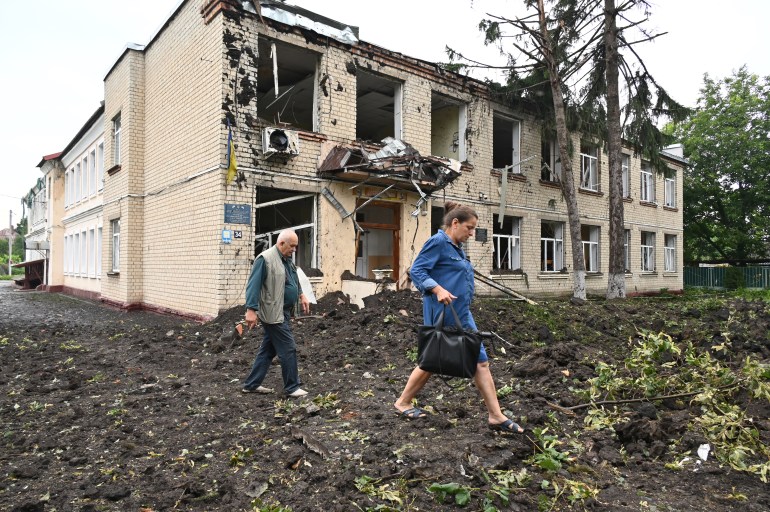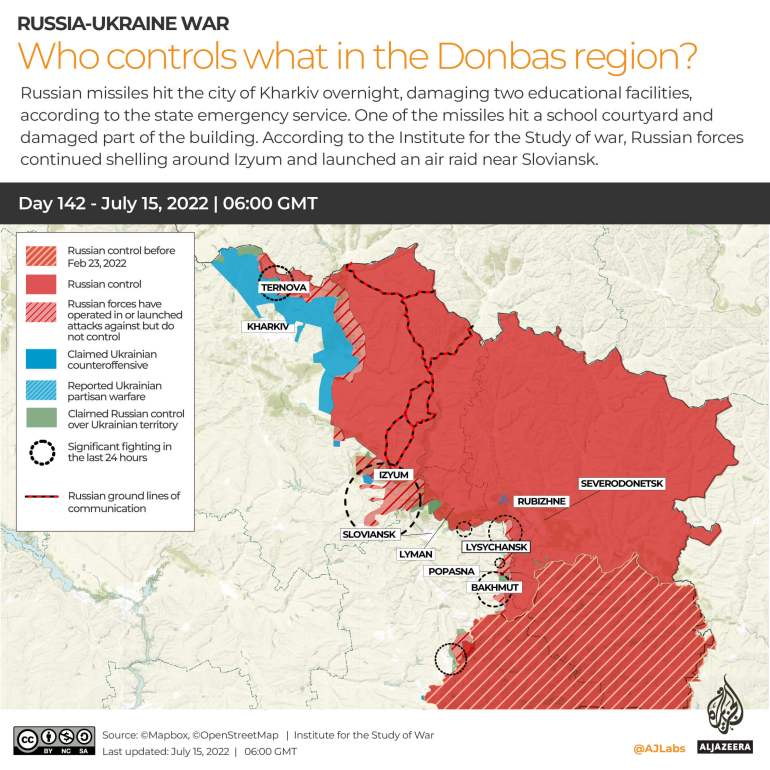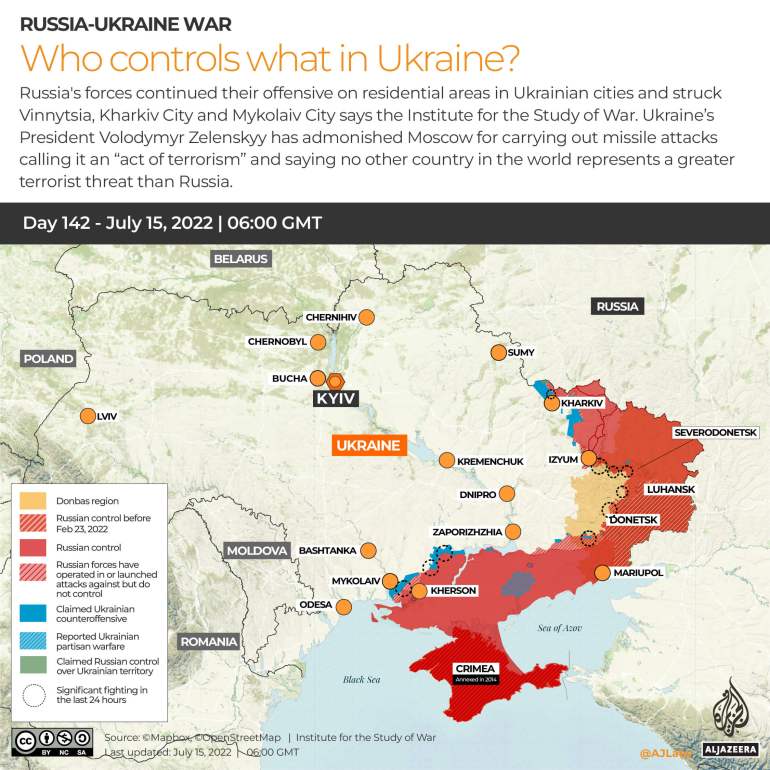Civilians killed as Russia intensifies attacks across Ukraine
Russian forces fire missiles and shells across Ukraine after military announces it is stepping up its onslaught.

KATHMANDU: Russian forces have fired missiles and shells at cities and towns across Ukraine after Russia’s military announced it was stepping up its onslaught against its neighbour, with Ukrainian officials reporting that at least 17 more civilians had been killed.
Russian Defence Minister Sergei Shoigu gave “instructions to further intensify the actions of units in all operational areas, in order to exclude the possibility of the Kyiv regime launching a massive rocket and artillery attacks on civilian infrastructure and residents of settlements in the Donbas and other regions,” his ministry said on Saturday.
Russia’s military campaign has been focusing on the eastern Donbas region, but the new attacks hit areas in the north and south as well. Kharkiv, Ukraine’s second-largest city, has seen especially severe bombardments in recent days, with Ukrainian officials and local commanders voicing fears that a second full-scale Russian assault on the northern city may be looming.
At least three civilians were killed and three more were injured on Saturday in a pre-dawn Russian rocket attack on the northern Ukrainian city of Chuhuiv, which is close to Kharkiv and only 120km (75 miles) from the Russian border, a regional police chief said.
Serhiy Bolvinov, the deputy head of Kharkiv’s regional police force, said the rockets partly destroyed a two-storey apartment building.
“Four Russian rockets, presumably fired from around (the Russian city of) Belgorod at night, at about 3:30 am, hit a residential building, a school and administrative buildings,” Bolvinov wrote on Facebook. He said the bodies of the three dead civilians were found under the rubble.
In the neighbouring Sumy region, one civilian was killed and at least seven more were injured after Russians opened mortar and artillery fire on three towns and villages not far from the Russian border, regional governor Dmytro Zhyvytsky said Saturday on Telegram.

Later in the day, on the outskirts of Pokrovsk, a city in the Donetsk region, a woman said a neighbour was killed by a rocket attack Saturday afternoon. Tetiana Pashko told The Associated Press she herself suffered a cut on her leg, and one of her family’s dogs was killed.
She said her 35-year-old neighbour, killed while in her front yard, had evacuated earlier this year as authorities had requested but had returned home after being unable to support herself. Several homes on a quiet residential street were damaged, with doors and roofs torn up or ripped away.
In the neighbouring Luhansk region, Ukrainian troops repelled a Russian overnight assault on a strategic eastern highway, regional governor Serhiy Haidai said, adding that Russia had been attempting to capture the main road between the cities of Lysychansk and Bakhmut for more than two months.
“They still cannot control several kilometres of this road,” Haidai wrote in a Telegram post.
The Luhansk and Donetsk regions make up the Donbas, an eastern industrial region that used to power Ukraine’s economy and has mostly been taken over by Russian and separatist forces.
In Ukraine’s south, two people were wounded by Russian shelling in the town of Bashtanka, northeast of the Black Sea city of Mykolaiv, according to the regional governor, Vitaliy Kim. He said Mykolaiv itself came under renewed Russian fire before dawn Saturday. On Friday, he posted videos of what he said was a Russian missile attack on the city’s two largest universities and denounced Russia as “a terrorist state”.
In Odesa, a port city on the Black Sea, a Russian missile hit a warehouse, engulfing it in flames and sending up a plume of black smoke, but no injuries were reported, local officials said.

Russia accused of shelling from captured nuclear plant
Two people were killed and a woman was hospitalised after a Russian rocket hit the eastern riverside city of Nikopol, emergency services said. Dnipro regional governor Valentyn Reznichenko said a five-storey apartment block, a school and a vocational school building were damaged.
Ukraine’s atomic energy agency accused Russia of using Europe’s largest nuclear power plant to store weapons and shell the surrounding regions of Nikopol and Dnipro that were hit Saturday.
Petro Kotin, president of Ukrainian nuclear agency Energoatom, called the situation at the Zaporizhzhia nuclear plant “extremely tense” with up to 500 Russian soldiers controlling the plant.
The plant in southeast Ukraine has been under Russian control since the early weeks of Moscow’s invasion, though it is still operated by Ukrainian staff.
“The occupiers bring their machinery there, including missile systems, from which they already shell the other side of the river Dnieper and the territory of Nikopol,” he said in a Ukrainian television interview broadcast Friday.

The Ukrainian air force said Russian forces fired six more cruise missiles on Saturday from strategic bombers in the Caspian Sea, and two hit a farm in the Cherkasy region along the Dnieper River. No one was hurt, but agricultural equipment was destroyed and some cattle were killed, regional governor Ihor Taburets said.
The Ukrainian air force said the other four missiles were intercepted.
On Friday, cruise missiles fired by Russian bombers struck Dnipro, a major city in southeastern Ukraine on the Dnieper River, killing at least three people and wounding 16, Ukrainian officials said. In a news briefing Saturday, Russian defence officials claimed that the attack had destroyed “workshops producing components for, and repairing, Tochka-U ballistic missiles, as well as multiple rocket launchers”.
Ukraine’s Interior Ministry said Friday that Russian forces have conducted more than 17,000 attacks on civilian targets during the war, killing thousands of fighters and civilians and driving millions from their homes.
–Aljazeera









